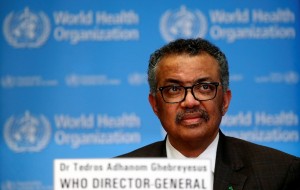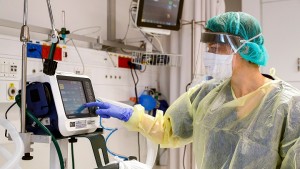Has the world failed in prioritizing health?
M.H. Rehman
Covid-19, the respiratory illness caused by the novel coronavirus, has become as universal as something can ever be. It currently affects almost every single country as well as numerous ships and vessels in open seas. Not only has the virus reached every part of the world, it has played havoc with flow of life everywhere without any exception. It has become one of the severest global crises the world has faced in recent times.
Since it is a new virus and finding a vaccine and/or efficacious medication will take time, the only remedy at this point is prevention. Countries have resorted to lockdowns and taking measures to ensure social distancing among people so that spread of the virus can be curtailed. Closure of educational institutions, public offices and industries and ban on public transport are all damage-control measures. As the world scrambles to pass through this pandemic with as little further harm as possible, the question how we reached this juncture begs an answer more than ever before. Moreover, the Covid-19 pandemic has been severely damaging economic activities across the world and serious socio-economic fallouts cannot be ruled out in the weeks and months to come.
Technological advancements in all fields and unimagined levels of automation aided by artificial intelligence had created an image of the modern world as if it was invincible. Majority of people could not even think that the entire world will find itself so helpless against something. People around the world found it hard to believe, therefore, when the virus started to spread, shutting down life was slated to be the only defence against it. In this age of social media, polarized opinions started making rounds with some unearthing conspiracy theories, some chipping in with premonitions of end of the world, and others sticking to religious notions of sins and resultant torments. Whatever the reason, it is only logical to analyze humanity’s failure in tackling the pandemic better than it has. There are genuine questions as to continued lack of focus and investment in the health sector over time, which left the humanity vulnerable to this pandemic to a large extent. In other words, the virus caught humans off-guard.
There is an evolving consensus that the world on the whole has focused too less attention and funding on health. It is based on hard reality that all countries faced shortage of testing kits, personal protective equipment such as masks and gloves for the general public, and face shields and body suits for healthcare providers, general as well as intensive care beds and lifesaving machinery such as ventilators. This want of machinery and equipment has been sufficiently highlighted but what hasn’t been spotlighted enough is the want of healthcare providers in sufficient numbers. Many countries had to fast-track final-year medical students into fully qualified doctors. Similar measures were also taken for nurses and paramedics.
One can argue that healthcare systems around the world were inadequately staffed and insufficiently equipped. What to talk of developing countries, even the developed countries have failed miserably on this front. The world has seen Europe and the United States, the most developed and economically prosperous regions by far, show unforgiving levels of readiness and lack of medical supplies, so much so that even healthcare professionals didn’t have personal protective equipments many days into the pandemic.
As of writing of these lines, many states in the USA are competing against one another for procurement of these crucial supplies. In Europe, all countries but Finland had dismantled the ‘critical healthcare stock’ that was established during World War II to cater for medical emergencies en masse. In the US, the Trump administration disbanded “National Security Council’s Directorate for Global Health Security and Bio-Defense”in the White House in 2018. The Directorate was set up to be the “smoke alarm” and get ahead of emergencies and sound a warning at the earliest sign of fire.
Nonetheless, would it be feasible to overstock medical supplies and erect significantly more than needed health infrastructure in anticipation of a pandemic? If we keep as many ventilators in routine as are needed in these times, they won’t be in use and rust anyway. In usual circumstances most, if not all, countries would have sufficient health infrastructure. How do we know how often such a thing is going to hit? These are logical counterarguments that carry weight. But that’s not the argument, in the first place. Argument is to avoid getting to this stage where all these medical supplies and health infrastructure is urgently needed. The argument is to improve world’s ability to have credible smoke alarms in place and be ahead of the emergencies, as much as possible. It is about nipping the evil in the bud.
Let us, for a moment, think of ways to identify the threat as early and as best as possible. What about more technology and innovation into identifying new viruses, studying them, locating them and reverse engineering to find cure/vaccine? What about the fact that humans have developed telescopes that can look farther than our galaxy but not microscopes that can easily identify a new virus from known viruses? Why is it that we still have to run human trials for 12-18 months to be sure if a vaccine will work instead of being able to run credible simulations through supercomputers to get to same results in no time and without any human trials? How come the technology has every inch on the earth covered by not one but multiple mapping companies but no such innovation on threats to human health? Why can’t the world have groundbreaking technology to detect new viruses when it has satellites orbiting the earth thousands of miles above that can detect mineral deposits underneath the earth? How difficult should it be to invent advanced optical equipment to scan presence of virus in an environment—building, room, aeroplane, ship, on a surface—in the presence of sophisticated gear that can scan heat, retina, waves, radiation and what not from considerable distances? Despite knowing the strain of coronaviruses for the last many years, why the world on the whole struggled to roll out speedy testing kits for the novel coronavirus? We see life-changing innovations in a host of fields at unprecedented speeds but can we recall one such innovation in the health sector? Among a plethora of smartphone apps and computer applications, how many, if at all, are on human health? Advancements in weather forecasting technology have helped save lives around the world, notwithstanding the differences between the two, similar strides can, and should, be made in early detection technologies against viruses and similar dangers to human health. 
There is no denying the fact that a large number of companies, universities, research organizations, NGOs and governments around the world are, and have been, working in health sector, and their appreciable work has yielded positive results too. The question is, is that enough? Is that something that can help face out of the ordinary challenges such as Covid-19? Is that enough to establish health as one of the priority areas? From what the experience with Covid-19 has so far shown, the answer is a big NO. The situation points to only one grim reality: humans have not prioritized their own health.
Another dark side of this issue is pervasiveness of injustice and unequal distribution of resources in the health sector as well. A pandemic affects public at large; therefore, we are observing novel coronavirus infections among the high-income segments of society as well; however in the normal circumstances healthcare infrastructure is designed such that it caters well to the higher-income strata and leaves the lower-income strata in the lurch.
A vast majority of populations in low-income countries can neither access nor afford quality healthcare facilities. And then, the elite hardly ever depend on healthcare facilities of their countries; most fly out to developed countries for treatments. Hence, not investing enough in health further aggravates the socioeconomic segregation and puts the impoverished at higher risk of contracting illnesses, and dying of those. Data of Covid-19 also points to this bitter fact. Although the virus is not differentiating in who it infects, healthcare seems to be doing it. Almost all the VIPs who got infected have recovered. Among 120,000 deaths, overwhelming majority is of people from lower-income strata. It’s just not a coincidence. A Chicago Tribune report dated 7th April 2020 revealed that in Chicago area, the African-Americans had a death rate six times higher than that of the Caucasians from Covid-19. Statistics from other countries are also telling.
Evolution is all about learning from mistakes and converting threats into opportunities. The Covid-19 pandemic shall serve as a wake-up call to the world; a call to prioritize health. Considerable financial and technological investments need to be made in health sector so as to have most modern equipment possible in place for early detection, study and control of new viruses on the one hand, and adequate healthcare infrastructure ready to meet any unforeseen challenges aptly, on the other. Facilities should be expanded to the extent where healthcare becomes universally and easily accessible to every single human being irrespective of his/her income level.
Significant improvements and investments also need to be made in devising global standard operating procedures and equipment/procedures that, by providing safe ways of going out and transacting business as usual, can ensure smooth flow of life even during the pandemics. All these investments, focus and prioritization would propel humanity to the level where it is not caught off guard by a pandemic in future. It is established now that the current pandemic is going to usher the world into a recession and all economies will struggle to get back to normal. One wonders, had billions been spent on health in the past, trillions would not have to be spent now on rescue packages. Not to mention the lives that could have been saved and economic crises billions around the world would be facing in months and years to come. Against this background, heavy investment in health to evade similar situations in future is very much worth it.
The writer is a Fulbright alumnus, presently serving as Deputy Secretary in the Federal Government.
 Jahangir's World Times First Comprehensive Magazine for students/teachers of competitive exams and general readers as well.
Jahangir's World Times First Comprehensive Magazine for students/teachers of competitive exams and general readers as well.




